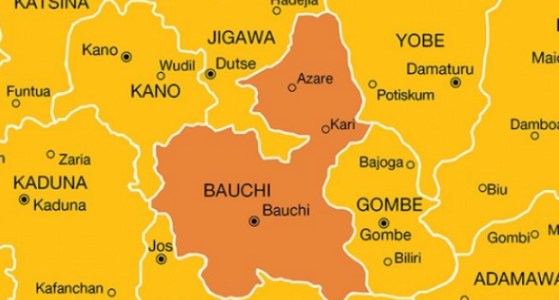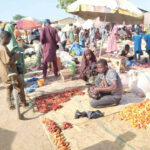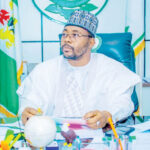Travelling by road from Jos to Bauchi to Gombe to Kano, and all along the roads one can see clearly the level of destruction to forests by the use of simple chainsaw machines.
Forest bandits, armed with cheap machines that can cut 50-year-old tree in less than five minutes, coming from far and wide in cohort with local leadership ferry firewood and charcoal to major cities in Kano, Jos, Maiduguri and the Bauchi metropolis.
- UN Assembly: No going back on mega protest — Yoruba Nation, others
- 90,000 Anambra children out of school
The heaps of charcoal and the vehicles carrying firewood in all directions tell you that in the next few years Bauchi State will be in real trouble of not only losing her fertile land but how to deal with the ever encroaching desert.
According to the International Bank of Reconstruction and Development (IBRD) Forestry II appraisal Report (1994), a total of 28,860 sq.km or about 43 per cent of the total land area of Bauchi State is under threat of desertification. This area covers Gamawa, Zaki, Katagum, Jama’are, Shira, Misau, Darazo, Dambam, Itas Gadau and Giade local government areas. The degree of desertification is said to be much higher in Gamawa, Zaki, Katagum, Giade and Jama’are LGAs.
These areas also suffer from scanty vegetation cover, constant decrease in annual rainfall and underground water which constantly dries out affecting the trees in those areas.
Between 1994, when the study was conducted and now, the degradation of the environment has exacerbated through the commercial scale and uncontrolled cutting of trees, population explosion, and the keeping of large livestock in a free-range mode.
The large-scale deforestation also exposes the soil to high temperatures which break down the organic matter, increase evaporation and makes the soil vulnerable to the prevailing erosive winds and torrential rains and the associated decline in the fertility of the soil.
The Yankari Game Reserve, established in the 1950s, is not only losing its pristine woods but some of the rarest animal species to invasion of the reserve by wood merchants and poachers looking for rare animals for their skins and horns for use in traditional medicines. The Lame-Burra game reserve, established in the 70s is only a game reserve in name having lost 80 per cent of what made it a game reserve. What remains of it are woodlots with new settlements in and around the reserve.
With no trained rangers and conservators, the Yankari Game Reserve, against all conventions is being run by an NGO (WSO) because the state lacked trained and dedicated manpower.
With reduced institutional capacity, coupled with dwindling budgetary allocations, the ministries of agriculture and that of environment have no capacity to manage the looming ecological catastrophe talk less spearheading new ideas.
Several attempts in the past to confiscate illegally sourced wood and charcoal came to nothing immediately after the change of government in 2015.
With increased urbanization and poor yields in agricultural produce, especially in the rural areas, the rural dwellers resort to massive destruction of forest resources to supplement their income. Increasing levels of poverty as a result of climate change and the high levels of poverty are also fuelling their competition to the charcoal business.
Between 1977 and 1992, the Bauchi State government, in conjunction with the World Bank Forestry II Project, embarked on a massive desertification plan in which it established 36 kilometre of forest shelter belts, 1,750 hectares of rural woodlots, and produced and distributed 10 million assorted seedlings. The project also assisted farmers to establish 250 hectares of private orchards in the northern parts of the state. It also distributed about 5,000 improved wood cooking stoves to individuals. Since then, there had not been any concrete effort to deal with the menace of desertification, deforestation and soil degradation in a consistent manner.
To make matters worse, for more than a decade no seedlings whether by the state ministry of agriculture or local governments have been raised or distributed. Before then, the state ministry of agriculture used to raise half a million seedlings for planting annually while the local governments were each mandated to produce nothing less than 50,000 seedlings for planting in their own areas.
The attitude of subsequent administrations in the last decades is purely geared towards crop production with emphasis on procurement and distribution of fertilizers and improved seeds.
Lack of investment in soil improvement, tree planting and the over hunting, cutting of trees and the unrestricted movements of herd of cattle across fragile lands gave birth to the unnecessary conflict between herders and farmers which resulted into cattle rustling, banditry and the general insecurity in the sahelian region of Northern Nigeria.
The nonchalant attitude of the state government over the years can be seen in the non-budgetary allocation to this critical sector of remediation of the environment over time.
As at this year, millions of seedlings are made available under the Green Wall project, but the state government is yet to collect the seedlings four months after on the premise that it does not have the logistics.
Nigeria never lacked strategic action plans. For instance, that of 2020-2024, which identified land restoration as the cheapest solution to climate change and biodiversity loss. Even the United Nations Agenda 2030 provides for Nigeria to institute a new roadmap in tackling environmental degradation by making policies to strengthen programmes and projects through conservation of the environment with emphasis on halting land degradation, combating desertification and mitigating impacts of drought.
Time has come for the Bauchi State government to note that tackling environmental degradation through afforestation must be a priority. It must engage experts who have experience in managing the environment to be in the frontline in tackling this menace.
Nigeria and Bauchi State, in particular, must adopt the policy of each individual adopt a tree like it is done in other countries and pay stipend to individuals involved to ensure that the environmental remediation is seen as a priority.
The high level of poverty in the rural areas will only increase without taking adequate measures to increase the productivity of the land by increasing plant coverage to retain moisture and its fertility.
It is the ambition of the United Nations that by 2030, Africa should be able to restore one million hectares of currently degraded land, so as to create 10 million jobs in the rural areas. Bauchi State on its part must set clearly defined targets of its own in this regard.
The impunity that has characterized the willful damage to the environment must stop because it is a religious duty. Islam has taught us that one of the greatest charities that will continue even after our death is the planting of trees. It is time to walk the talk.
By Adamu Lawal Toro, who lives in Zone 7, Wuse, Abuja

 Join Daily Trust WhatsApp Community For Quick Access To News and Happenings Around You.
Join Daily Trust WhatsApp Community For Quick Access To News and Happenings Around You.


